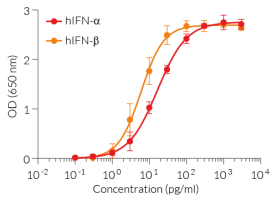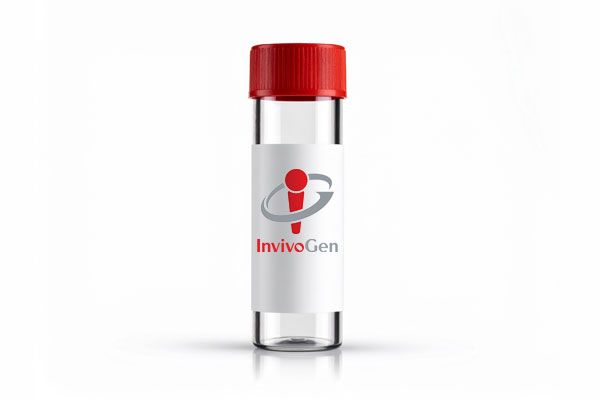Anti-hIFN-β-IgG
-
Cat.code:
mabg2-hifnb-3
- Documents
ABOUT
Neutralizing IgG monoclonal antibody to human interferon-beta
Anti-hIFN-β-IgG (clone 10B10) is a monoclonal antibody for human interferon β (hIFN-β). This antibody has been produced in hybridomas and purified by affinity chromatography.
Anti-hIFN-β-IgG has been selected for its ability to efficiently neutralize the biological activity of hIFN-β. IFN-β is an important anti-viral cytokine that also has anti-proliferative and immunomodulatory functions [1, 2].
Key features:
- Reacts with hIFN-β
- Provided azide-free
- Each lot is functionally tested
References:
1. Schreiber G. 2017. The molecular basis for differential type I interferon signaling. J. Biol. Chem. 292:7285-94.
2. McNab F. et al., 2015. Type I interferons in infectious disease. Nat Rev Immunol. 15(2):87-103.
All products are for research use only, and not for human or veterinary use.
SPECIFICATIONS
Specifications
IFN-β
Human
Sodium phosphate buffer, glycine, saccharose, stabilizing agents
Negative (tested using EndotoxDetect™ assay)
Neutralization assay
Each lot is functionally tested and validated.
CONTENTS
Contents
-
Product:Anti-hIFN-β-IgG
-
Cat code:mabg2-hifnb-3
-
Quantity:3 x 100 µg
Shipping & Storage
- Shipping method: Room temperature
- -20 °C
- Avoid repeated freeze-thaw cycles
Storage:
Caution:
Details
Type I interferons, in particular interferon-alpha (IFN-α) and interferon beta (IFN-β), play a vital role in host resistance to viral infections [1, 2]. The type I IFN family is a multi-gene cytokine family that encodes 13 partially homologous IFN-α subtypes in humans (14 in mice), a single IFN-β, and several poorly defined single gene products (IFN-ɛ, IFN-τ, IFN-κ, IFN-ω, IFN-δ, and IFN-ζ) [1, 2]. IFN-α and IFN-β are the best-defined and most broadly expressed type I IFNs [2].
IFN-β and all of the IFN-α subtypes bind to a heterodimeric transmembrane receptor composed of the subunits IFNAR1 and IFNAR2 which are associated with the tyrosine kinases Tyk2 and Jak1 (Janus kinase 1) respectively. These kinases phosphorylate STAT1 and STAT2 which then dimerize and interact with IFN regulatory factor 9 (IRF9), leading to the formation of the ISGF3 complex. ISGF3 binds to IFN-stimulated response elements (ISRE) in the promoters of IFN-stimulated genes (ISG) to regulate their expression.
1. Schreiber G. 2017. The molecular basis for differential type I interferon signaling. J. Biol. Chem. 292:7285-94.
2. McNab F. et al., 2015. Type I interferons in infectious disease. Nat Rev Immunol. 15(2):87-103.
DOCUMENTS
Documents
Technical Data Sheet
Safety Data Sheet
Validation Data Sheet
Certificate of analysis
Need a CoA ?



